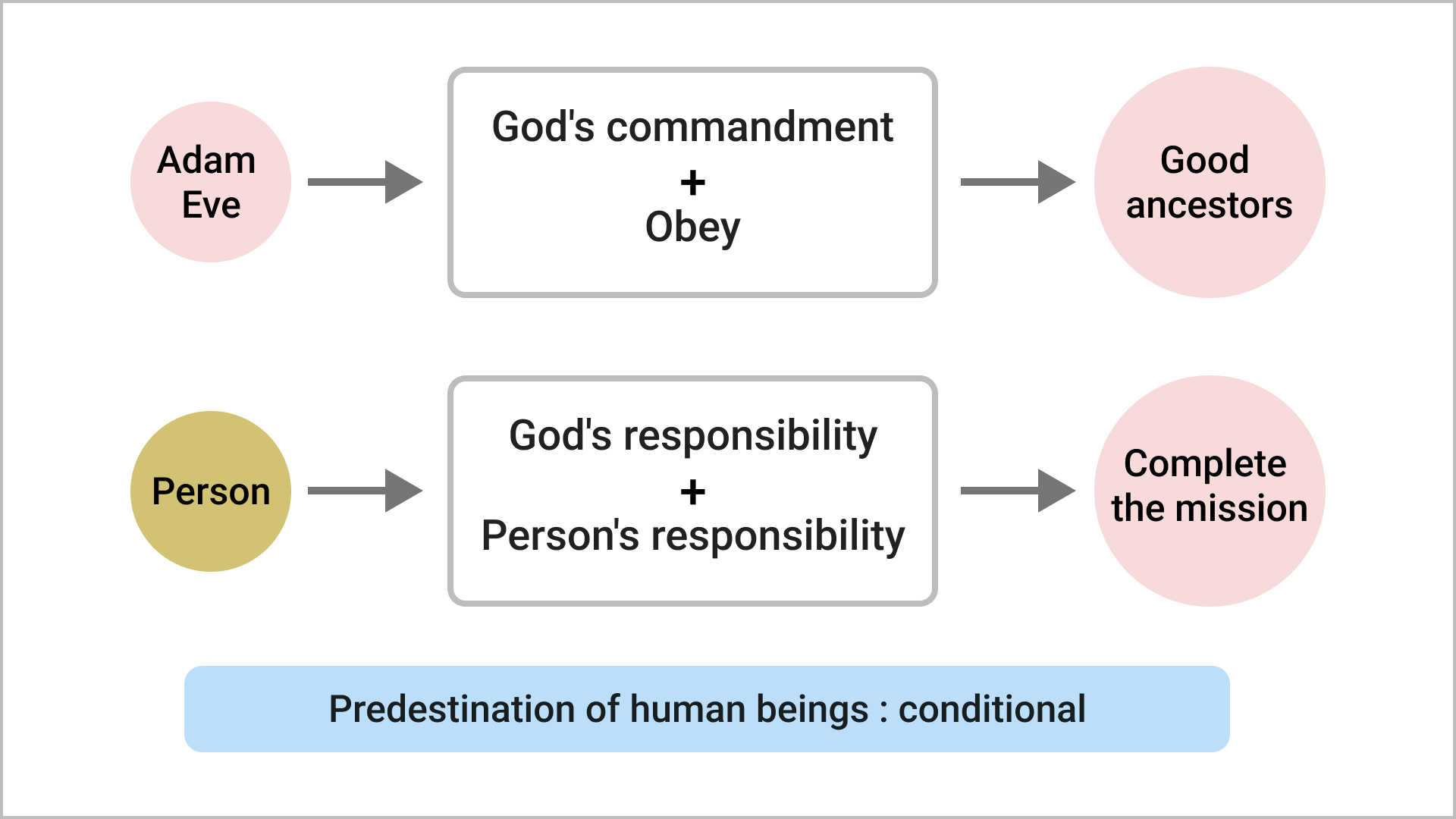아담과 해와는 선악과(善惡果)를 따먹지 말라 하신 하나님의 말씀을 지키는 것으로 자신들의 책임분담(責任分擔)을 완수함으로써 선의 인간 조상이 될 수 있었던 것이다. 따라서 하나님은 아담과 해와가 인간 조상이 되는 것을 절대적인 것으로 예정하실 수는 없었다. 그러므로 타락한 인간도 그 자신의 책임분담을 완수함으로써만 하나님께서 예정하신 인물이 될 수 있는 것이기 때문에, 하나님은 그들이 어떠한 인물이 된다는 것을 절대적인 것으로 예정하실 수는 없는 것이다.
Adam and Eve were to become the good ancestors of humanity, conditional upon fulfilling their responsibility to obey God’s commandment not to eat of the fruit. Accordingly, God did not absolutely predestine that Adam and Eve would become our good ancestors. The same holds for all fallen people: they can become the ideal people God has foreordained them to be only when they complete their responsibility. Therefore, God does not predestine in absolute terms what kind of people they actually turn out to be.

그러면 하나님은 인간을 어느 정도로 예정하시는 것인가? 어떤 인물을 중심한 하나님의 ‘뜻 성사’에 있어서는 그 자신이 언제나 인간책임분담(人間責任分擔)을 해야만 된다는 필수적인 요건이 따라다닌다. 그렇기 때문에 하나님이 어떤 인물을 어떠한 사명자(使命者)로 예정하시는 데 있어서도, 그 예정을 위한 95퍼센트의 하나님의 책임분담에 대하여 5퍼센트의 인간책임분담 수행이 합하여서 그 인물을 중심한 뜻이 100퍼센트 완성됨으로써만 그러한 인물이 될 수 있도록 예정하신다. 그러므로 그 인물이 자신의 책임분담을 다하지 못하면 하나님이 예정하신 대로의 인물이 될 수 없는 것이다.
To what extent does God determine the fate of an individual? The fulfillment of God’s Will through an individual absolutely requires that he complete his responsibility. Hence, even though God predestines someone for a particular mission, God’s ninety-five percent responsibility and the person’s five percent responsibility must be accomplished together before the person can complete his given mission and fulfill God’s Will. If the person does not complete his responsibility, he cannot become the person God has purposed him to be.
예를 들면 하나님은 모세를 택하실 때에 그가 자신의 책임분담을 완수함으로써만 선민(選民)을 가나안 복지(福地)까지 인도할 수 있는 영도자(領導者)가 되도록 예정하셨다(출 3 : 10). 그러나 그가 가데스바네아에서 반석(磐石)을 두 번 침으로써 하나님의 뜻을 거역하여 자신의 책임을 다하지 못하게 될 때에 그 예정은 이루어지지 않았으며, 목적지를 향하여 가는 도중에서 죽고 말았다(민 20 : 7∼12, 20 : 24, 27 : 14).
For example, when God chose Moses, He predestined conditionally that when Moses fulfilled his responsibility, he would lead the chosen people into the blessed land of Canaan (Exod. 3:10). However, when Moses transgressed God’s Will by striking the rock twice at Kadesh-barnea, he failed. Consequently, Moses died before reaching his final destination, and God’s intention for him to lead the people into Canaan was not realized (Num. 20:2-13); (Num. 27:13-14).
한편 하나님이 가룟 유다를 택하실 때에도, 그가 충성으로 자신의 책임분담을 다함으로써만 예수님의 제자가 되도록 예정하셨다. 그러나 그가 자신의 책임을 다하지 못하였을 때에 그 예정은 이루어지지 않았고, 그는 도리어 반역자(反逆者)가 되고 말았다.
When God chose Judas Iscariot, He conditionally predestined that Judas would remain a loyal disciple of Jesus by faithfully completing his responsibility. Yet when Judas turned faithless, God’s expectation for him was not realized, and he ended up a traitor.
또 하나님이 유대인들을 세우실 때에도, 그들이 예수님을 믿고 모시어 맡겨진 책임분담을 완수함으로써만 영광의 선민(選民)이 될 수 있도록 예정하셨다. 그러나 그들이 예수님을 십자가에 내줌으로써 이 예정은 이루어지지 않았고, 따라서 그 백성은 쇠퇴해 갔던 것이다.
When God raised up the Jewish people, God predestined that they would be glorified as the chosen nation when they fulfilled their responsibility to believe in and attend Jesus. However, when their leaders sent Jesus to the cross, this preordained destiny was not brought to pass, and the Jewish nation was scattered.
다음으로는 하나님의 예정에 있어 복귀섭리(復歸攝理)의 중심인물(中心人物)이 될 수 있는 조건은 어떠한 것인가를 알아보기로 하자.
Let us next examine God’s predestination of central figures in the providence of restoration.
하나님의 구원섭리(救援攝理)의 목적은 타락된 피조세계(被造世界)를 창조본연(創造本然)의 세계에로 완전히 복귀하시려는 데 있다. 그렇기 때문에 그 시기의 차는 있으나 타락인간은 누구나 다 빠짐 없이 구원을 받도록 예정되어 있는 것이다(벧후 3 : 9). 그런데 하나님의 창조가 그러했듯이 그의 재창조역사(再創造役事)인 구원섭리도 일시에 이루어질 수는 없는 것이기 때문에, 그것은 하나로부터 시작하여 점차 전체적인 것으로 넓혀 가는 것이다. 하나님의 섭리가 그러하 기 때문에, 구원섭리를 위한 예정에 있어서도 먼저 그 중심인물을 예정하시고 부르시는 것이다.
The purpose of God’s providence of restoration is to restore completely the fallen world to the original world which God intended. Therefore, although the times of their salvation may differ, all fallen people are predestined to be saved (II Pet. 3:9). Yet, as was the case with God’s creation, His providence of salvation – a work of recreation – cannot be completed in an instant. It begins from one point and gradually expands to cover the whole. Therefore, in the providence of salvation, God first predestines one person to be the central figure and then calls him to a mission.
그러면 이렇게 부르심을 받는 중심인물은 어떠한 조건을 갖추어야 하는가? 그는 먼저 복귀섭리를 담당한 선민의 하나로서 태어나야 하며, 다음으로는 같은 선민 중에서도 선(善)의 공적이 많은 선조의 후손이어야만 한다. 그리고 똑같이 선의 공적이 많은 선조의 후손이라 하더라도 그 개체가 뜻을 이루는 데 필요한 천품(天稟)을 타고나야만 하는 것이며, 또 같은 천품의 인간이라 할지라도 이를 위한 후천적인 조건이 모두 구비되어 있어야 한다. 그리고 후천적인 조건마저 똑같이 갖춘 인물들 중에서도 보다 하늘이 필요로 하는 시기와 장소에 맞추어진 개체를 먼저 택하시는 것이다.
What qualifications should the person possess to merit such a calling? First, the central figure must be born into the chosen people. Next, even among the chosen people, he must come from an ancestral line with many good accomplishments. Among the descendants of this outstanding lineage, he must be endowed with the requisite character. Among those with the requisite character, he must develop the necessary qualities during his early life. Finally, among those who have acquired these qualities, God selects first the individual who lives in a time and place most fitting to His need.
